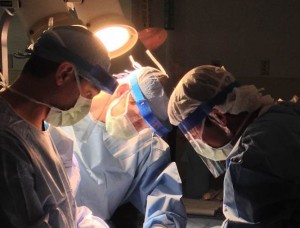Medical

When a person is seriously injured, the post-event response and trauma care is critical to improving their chances for survival and minimizing, if not preventing, prolonged disability or impairment. Most people around the globe have little or no access to trauma care. In the United States, research shows that receiving care at a Level I trauma center can decrease the risk for death among seriously injured patients by 25 percent.
Pre-hospital care and specialized emergency and trauma care services and their response capacity help reduce the consequences of injuries and their associated disabilities.
In addition to playing an integral role in setting up and evaluating experimental studies with post-mortem human subjects (PMHS), CAB's medical division is involved in the following medical training efforts:
- EMS, emergency medicine residents practice life-saving procedures
- Critical Care boot camp (4th year medical student elective)
- Diagnostic and Procedural Clinical Anatomy (4th year medical student elective)
- Trauma specialties and repair
- Medical student summer research program through the Office of the Vice President for Research Medical Examiner & VSAP program (exploring alternative/new embalming techniques)
- Anatomical training and instruction for grad students
- Life Saving Procedures for the Seasoned Emergency Medicine Veteran
- Pathology creation for surgical repair skill training CPR studies